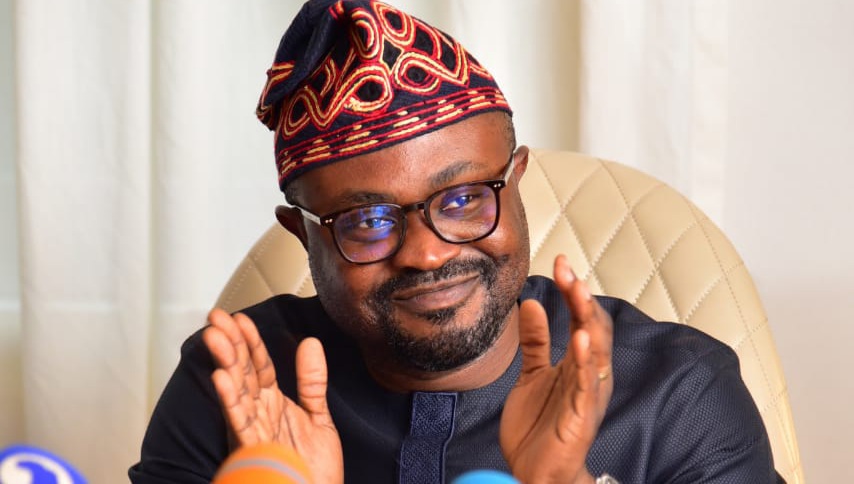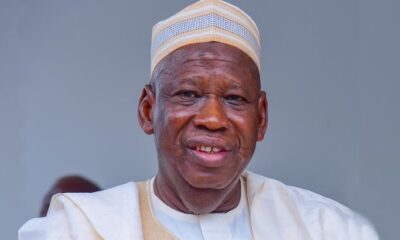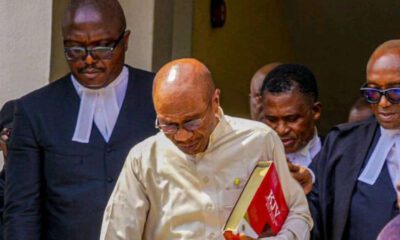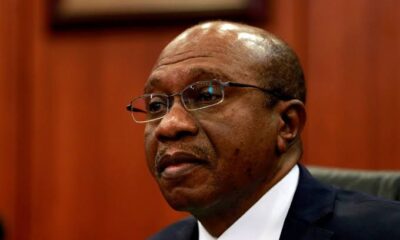News
Buhari, Boss Mustapha’s signatures were forged, witness tells court in Emefiele‘s case

An EFCC witness, Bamaiyi Mairiga on Thursday told an FCT high court, Maitama that the signatures of former President Muhammadu Buhari and the immediate past Secretary to the Government of the Federation (SGF), Boss Mustapha, were forged.
Mairiga, a forensic document examiner with the EFCC, said this while testifying in the ongoing trial of the immediate past governor of the Central Bank of Nigeria (CBN), Godwin Emefiele, before Justice Hamza Muazu.
Emefiele is charged with an amended 20-count charge bordering on conferment of corrupt advantage, forgery, criminal breach of trust, conspiracy to obtain by false pretence and obtaining money by false pretence.
The sacked CBN governor is accused in the charge of forging a document titled: Re: Presidential Directive on Foreign Election Observer Missions dated 26 January, 2023 with Ref No. SGF.43/L.01/201 and purported same to have emanated from the office of the Secretary to the Government of the Federation to the Governor of the CBN.
He is further alleged to have, on Feb. 8, 2023 knowingly obtain, by false pretence, 6,230,000.00 dollars by falsely representing that the SGF via a letter dated 26 January, 2023 with Ref No. SGF 43/L.01/201 requested the CBN to provide a contingent logistic advance in the sum of $6,230,000 “in line with President’s directive”.
He, however, pleaded not guilty to the charge preferred against him.
Testifying as the sixth prosecution witness (PW6), Mairiga, said that he was on secondment to EFCC from the Nigerian Immigration Service (NIS).
He told the court that the forensic department of EFCC received a request for the examination of some signatures that were forwarded to the department.
Led in evidence by the prosecution counsel, Rotimi Oyedepo, SAN the witness told the court that as an expert, he knew as a fact that no two writers shared identical handwriting characteristics.
He added,two writers could not produce their writing exactly and no writer could exceed their skill level.
According to the PW6, “With this in mind, the signatures were examined for presence of life quality, slants, alignment, diacritical placement, pen movement, skill of execution and comparisons of class and individual characteristics against the specimen signatures.”
Mairiga told the court that both the disputed and specimen signatures were analysed to identify individual characteristics present or absent in each of the signatures.
The witness added that a comparison of the identified individual characteristics in both the disputed and specimen signatures were compared to establish similarities and dissimilarities.
“To verify the entire process, further analysis was carried out using further methodology and a peer review by another expert so as to validate it in terms of reproductibility.
“The conclusion from the analysis revealed that the disputed document showed evidence of forgery and copy act,”
Mairiga told the court.
He said it was found out that the skill of execution was discovered to be different from that of the specimen signatures.
The witness added that, “Specifically, the disputed signature and the specimen signatures were found to be different in respect of pen movement, skill of execution, loop formation. There was individual characteristic.
“This is a confirmation that the author of the specimen signature did not write the signature of Muhammadu Buhari on the disputed document.”
According to him, same analysis process led to the conclusion that, “the author of the specimen signature did not write the signature of Boss Mustapha on the disputed document.”
Mairiga added that the process was reduced to a report, which was tendered as an exhibit before the court.
Without any objection from the defence, the report was admitted and marked a second EXhibit FDE.
Oyedepo asked the witness to identify the disputed document in the previous exhibits, marked Exhibit PD6 and Exhibit PD7.
Mairiga told the court that the disputed document in Exhibit FDE was the document titled, “Presidential Directive on Foreign Election Observe Mission” purportedly signed by Muhammadu Buhari, which was marked “X” in the exhibit.
He added that the second disputed document was marked “X1”, titled “Re: Presidential Directive on Foreign Election Observe Mission” purportedly signed by Boss Mustapha.
While being cross examined by counsel for Emefiele, Matthew Burkaa ,SAN, the witness told the court that though he was on secondment from the Immigration, he reported daily for work at the forensic department of EFCC.
He further told the court that he had been on secondment to the anti-corruption commission since 2018.
He added that the Head, Forensic of EFCC is Benedict Agboye, who he said was an expert in question document analysis.
The witness said it is preferable in question document analysis to compare original document to original instead of photocopy, adding that both original and photocopy could be compared.
At a point during cross examination of the witness, Burkaa applied to the court to formally note the witness as being in court deliberately to mislead the court.
“Court should take note of his (Mairiga) demeanour of deliberately refusing to answer questions from the defence and the court to mislead them,” Burkaa said.
The prosecution counsel, however, countered this, saying the court has the responsibility of observing the demeanour of a witness.
He added:”it is unfair for the defence to say that the witness is in court to mislead it.”
Mairiga later told the court that in the report he issued, he analysed the signature of both former President Bihari and that of Boss Mustapha but did not analyse Emefiele’s signature.
Meanwhile, Justice Muazu adjourned the continuation of hearing until March 11
News
Aiyedatiwa congratulates Interior Minister at 42


Gov. Lucky Aiyedatiwa of Ondo State on Wednesday, congratulated the Minister of Interior, Mr Olubunmi Tunji-Ojo, on his 42nd birthday anniversary.
This is contained in a statement in Akure by his Chief Press Secretary, Mr Ebenezer Adeniyan.
The governor celebrated Tunji-Ojo’s vigour, strength, ingenuity and the positive spirit that every Ondo indigene carried in their blood.
Aiyedatiwa said since his appointment as minister of interior, he had remained the poster child of the Renewed Hope Agenda of the present administration.
He said that the minister had done so with his unprecedented achievements that had brought relief to Nigerians, home and abroad.
“I am particularly proud of his achievements in driving the Renewed Hope Agenda of President Bola Tinubu.
*He has shown the world the stuff we are made of in Ondo state. He has soared our ‘can do’ spirit in the Sunshine State.
“Tunji-Ojo is flying higher among his peers with unprecedented substantial reforms in the ministry of interior through his relentless sacrifices, ingenuity and patriotism.
“The ease with which Nigerians now get their passports can only be considered magical.
“At 42, we are proud of the exploits of our darling Tunji-Ojo. I congratulate him on his birthday and I pray that his wisdom and strength will increase in order to do more for his fatherland,” he said.
Olubunmi Tunji-Ojo is a former member of the house of representatives for Akoko North East and Akoko North West Federal Constituency and served as the chairman, house committee on NDDC.
News
NTAC D-G urges employers to demonstrate love for Nigerian workers


The Nigerian Technical Aid Corps (NTAC) has urged employers of labour to use the occasion of the International Labour Day to demonstrate love for Nigerian workers.
The Director-General of NTAC, Dr Yusuf Yakub, said this in a statement signed by Mr Nkem Anyata-Lafia, his Special Assistant on Media and Publicity on Wednesday in Abuja.
The former lawmaker said Nigerian workers should be appreciated for their contributions to national development.
“On May 1 every year, the entire world recognises the central role workers play in harnessing the productive capacities available to different workforces across endeavours, and countries.
“The efforts are to ensure that the global economy is sustained and that the place of man as the centrepiece of global activities is preserved.
“We choose to pause for a day to honour those whose hands fertilise the earth, whose brains birth grand ideas that rule our world and whose efforts power the wheels of daily living and activities across countries ,homes, professions and the like.
“This year’s May day is no different from the others gone by,” he said.
Yakub added: “It is, however, another opportunity to celebrate our workers, to wish them well, to show that we care and to give them a soothing pat on the back for the days they stay out when others are home.
“For the times they lose sleep when others are in bed and for the efforts they make daily to ensure that the machine of daily life and living does not grind to a sudden halt!
“Today offers us the rare opportunity to bring to the front burner, issues concerning our workers, their welfare and their general well-being.
“As we join other parts of the world to celebrate May Day as a nation, the celebration offers us the opportunity to, in all honesty.”
“Review issues concerning the Nigerian worker and appreciate the sacrifice and commitment he/she makes to national progress and development.
“I wish to congratulate our leaders and the Nigerian workers on the occasion of the 2024 workers’ day celebration.”
News
CBN stands firm on LDR policy to curb inflation


The Central Bank of Nigeria has again justified its reliance on the Loan Deposit Ratio to control the country’s rising inflation.
The apex bank also said it is ready to do whatever it takes to reduce the inflation rate.
The CBN’s Acting Director of the Banking Supervision Department, Dr Adetona Adedeji, disclosed this in ‘CBN Talk Today,’ a podcast recently uploaded to the bank’s website titled “Loan to Deposit Ratio Adjustment.”
Recall that CBN reduced the LDR of banks from the previous 65 percent to 50 percent, a move the regulator said would stabilise the economy.
Adedeji said the use of LDR as a control measure for inflation started in 2019 when it was observed there was a massive slowdown in credit growth.
“This policy was created to ensure that money flows into the real sector of the economy. The LDR then was set at 60 percent, and later increased to 65 percent before it was last week reduced to 50 percent. And if you want to combat inflation using the orthodox method, you need to balance what you do with the monetary policy tools and other measures,” he said.
Speaking about the nexus between the LDR and rising inflation, he said the last Monetary Policy Committee decided to purge the financial system of excess cash by raising the Monetary Policy Rate.
At the last MPC, the bank raised the MPR by 200 basis points to 24.75 percent from 22.75 percent; and adjusted the asymmetric corridor around the MPR to +100/-300 basis points.
He explained that although the MPC decision limited the ability of bank customers to take loans and reduce the volume of loans accessed by borrowers, it also limited the volume of cash in circulation, a move he noted is good for the financial health of the country noting that any policy that enables banks to lend more, will indirectly increase the money supply and raise the inflation rate.
“There is an inverse relationship between loan-to-deposit ratio, monetary policy rate, and cash reserve ratio. If you are going contractionary, you have to increase both the Monetary Policy Ratio and Cash Reserve Ratio. But to achieve your results further, what you need is to reduce the LDR to control inflation, and that was what the CBN did,” he said.
Explaining further, he said that when the money supply is reduced, the interest rate will also go up.
The contractionary measure of the CBN means that it wants to reduce money supply. And when an economy is experiencing inflationary pressure as it is currently with Nigeria, it is the duty of the apex bank to ensure price stability.
“To achieve this, the apex bank uses diverse means including the option of adjusting the money supply, the best option is to bring down the LDR to ensure that banks’ ability to lend more to the economy and circulate more cash is reduced,” he said.
While acknowledging the adverse effects of the policy, Adedeji said there must be a tradeoff for the economy to move forward.
If you look at the traditional Phillips curve, it says you cannot fight two things at the same time, there could be a trade-off. If you are fighting inflation, you cannot fight unemployment at the same time.
“The Phillips curve states that inflation and unemployment have an inverse relationship. Higher inflation is associated with lower unemployment and vice versa. Even if you are going to fight it, it will not be at the desired level.
“So, you have to choose either to fight inflation or unemployment. Both are key macroeconomic objectives that are very critical to the development of the economy,” he stated.
He said that looking at other economies suffering from high inflation rates, the best thing to do at this time is tracking inflation rather than looking at economic growth at this time.
“We will continue to fight inflation, and when we bring inflation down, we will start talking of economic growth,” he said.
The National Bureau of Statistics reported that in March, the country’s inflation rate rose to an all-time high in the first quarter of the year, at 33.2, which is higher than 31.70 percent in February and 29.90 percent in January.
The apex bank listed key drivers of inflationary pressure as the strong exchange rate pass-through to domestic prices, the high cost of energy and other production inputs, lingering insecurity, especially in food-producing areas, and legacy infrastructure deficits.
He said the CBN is committed to ensuring that the inflation rate in the country drops using the right monetary policy tools, adding that the current LDR is aligned with the CBN’s current monetary tightening plan.
-
capital market2 years ago
Rt.briscoe, FBNH, Others halts negative performance of stock market
-
Finance3 months ago
Court orders Sen. Victor Umeh to repay N136m bank debt to AMCON
-



 Abuja Update2 months ago
Abuja Update2 months agoUNDP, FG partnership needed to achieve inclusion, equity- Minister
-
Abuja Update1 month ago
Banks drive stock market performance with N147bn gain
-



 Business1 week ago
Business1 week agoTingo Group unveils Tingo Electric, Tingo Cola drink at Lagos launch
-



 Health2 weeks ago
Health2 weeks agoCapacity training will reduce migration of health workers- NPHCDA
-
News4 months ago
Oil thieves sponsoring malicious media campaign against Navy – Spokesman
-



 Infotech1 month ago
Infotech1 month agoWorld Backup Day: NITDA urges Nigerians to ensure backup of data














